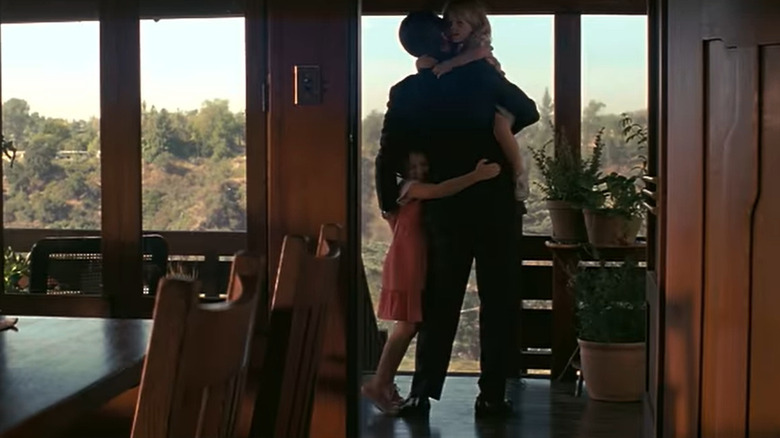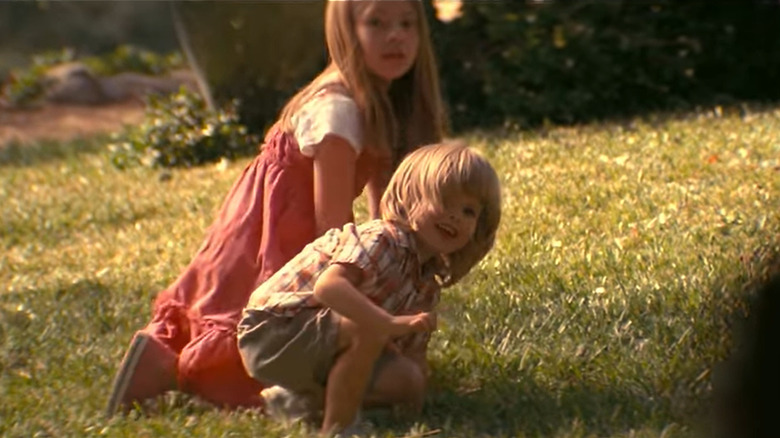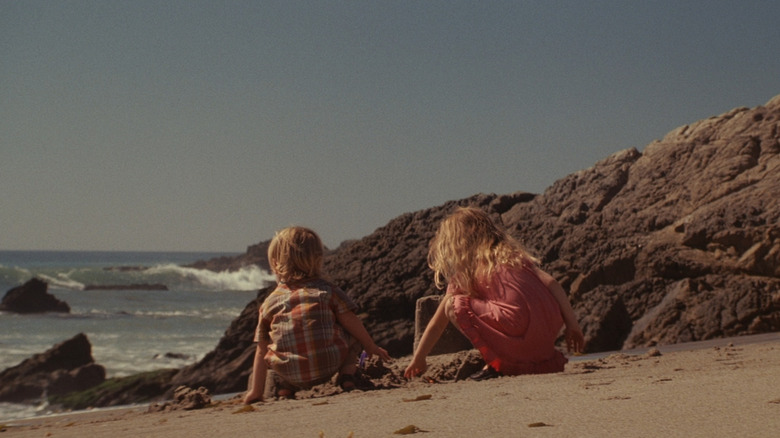The Final Four Words Of Inception Explained By Christopher Nolan
As much as "Inception" has a reputation for being overly complicated, the emotional core of the film is pretty simple: Cobb (Leonardo DiCaprio) is sad because he kinda, sorta murdered his wife Mal (Marion Cotillard), and his arc is about confronting his guilt so he can move on. Much has been made of that ambiguous dream totem that might have been about to topple, but the important thing is that Cobb doesn't stick around to watch it. He goes off to hang out with his children, demonstrating that this is the life he's chosen to live regardless of whether or not it's real.
Although the totem gets all the buzz, plenty of viewers have also zeroed in on another potentially ambiguous moment in that final scene: when Cobb picks up his young son, the kid says, "I built a house." As a Wired journalist pointed out in a 2010 interview with Christopher Nolan, "There's a building made of blocks on the dining table." Considering how much of the movie's narrative is about people building things — be them literal dream worlds or a false narrative for themselves — the line seems to hold extra meanings that might not have been intentional. Luckily, Nolan was able to share some of this thoughts on it:
"Anyone who's worked with child actors, even ones as great as the ones in this movie, knows that you basically have to ask a kid to improvise and they're going to say whatever they want to say. We certainly tried to choose the most apt takes. But yes, the film is about architects, builders, people who would have the mental capacity to construct large-scale worlds—the world of the dream. Everything is about how they would create, whether it's blocks or sand castles or a dream."
A thematic connection, not a literal one
By the sound of it, everything about what the kids said in the final scene was designed to either feel thematically relevant to the movie's big questions or to reinforce the idea that these are very much Cobb's kids. The movie doesn't actually spend much time with them, after all, so when it comes to making us believe that they're a driving force behind so much of Cobb's motivations, the movie really had to do as much as it could with the little time it had with them. Even the objects on the table revealed so much about the kids' personalities (like the fact that they like to play with the blocks), to help reinforce a sense of connection between them and Cobb. Just as Cobb's made a career out of building things in the dream world, his kids have that building instinct in them too.
"Everything is about how they would create, whether it's blocks or sand castles or a dream. These are all acts of creation," Nolan explained. "There's a relationship between the sand castle the kids are building on the beach in the beginning of the film and the buildings literally being eaten away by the subconscious and falling into the sea." Dreams tend to ebb and flow through a person's memories, taking them from one setting to another in ways that might seem jarring at first to an outside observer, and that's exactly the feeling "Inception" tries to invoke constantly throughout Cobb's journey. As Nolan continued:
"The important thing in 'Inception' is the mental process. What the dream-share technology enables them to do is remove physicality from that process. It's about pure creation. That's why it's a film about architects rather than soldiers."
Distinguishing dreams from reality: not that easy!
For a lot of the fan theories around Cobb's real life being a dream, they center around the movie's observation that memories and dreams have a ton of similar aspects. Much has been made, for instance, of the fact that Cobb's kids have their faces hidden for all of their early appearances in the film, an apparent allusion to the way that people's faces in dreams are often obscured. ("The Simpsons," of all shows, has also taken this observation and executed it with chilling effect.) This detail has often been piled onto the list of evidence that these kids are dream kids, not real ones.
But it's also an allusion to how people's faces can be obscured by memory. Even the most common observations about dreams, like the fact that it's so hard to remember them afterward, is basically true for real-life memories too. Just as most people can remember only specific fragments from last night's dream, when people try to remember what happened in any particular time period of their life, what comes to mind is usually just a handful of vivid moments and the strong emotions that come with them. The rest of the period isn't always lost, but you'll have to jog your memory a bit to get back to them.
It's no surprise that Cobb warns Ariadne so much about the dangers of mixing up the dream world from the real one or that so many of the fan theories center around the idea that Cobb's fallen victim to the same mistake. The real world — and so many films, for that matter – has plenty of dreamlike moments too.


